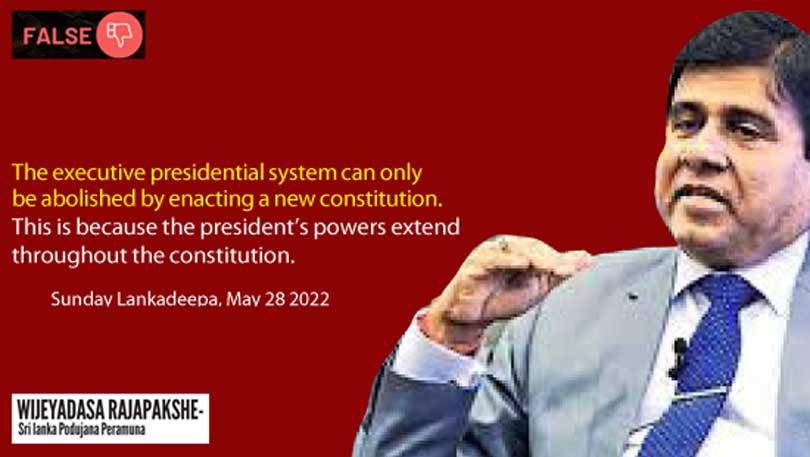23 Jun 2022 - {{hitsCtrl.values.hits}}

 The minister made this statement in the context of calls for the abolition of the executive presidency. In his statement, he claims that the executive presidential system cannot be abolished by way of an amendment, but only by enacting a new constitution. This may be read as claiming that (1) an amendment is not legally permissible, OR (2) it is not practically possible.
The minister made this statement in the context of calls for the abolition of the executive presidency. In his statement, he claims that the executive presidential system cannot be abolished by way of an amendment, but only by enacting a new constitution. This may be read as claiming that (1) an amendment is not legally permissible, OR (2) it is not practically possible.
To evaluate this claim, FactCheck.lk examined the provisions of the constitution, and determinations of the Supreme Court (SC).
As for claim 1, Article 75 of the constitution describes parliament’s legislative power, which includes the power to make laws repealing or amending any provision of the constitution, or to add any provision to it. Parliament is restricted only from making any law suspending the operation of the constitution or any of its parts, or repealing the constitution as a whole without enacting a new constitution to replace it. Chapter XII of the constitution is titled ‘Amendment of the Constitution’ and elaborates the procedural requirements for constitutional amendments.
The SC examined the scope of parliament’s power to amend the constitution in its determination on the bill to enact the 13thAmendment to the Constitution. The court considered arguments that Sri Lanka’s constitution had a “basic structure” which could not be changed byway of amendment. By its majority decision, the court rejected this argument in light of the clear constitutional provisions, and concluded, “Accordingly, we do not agree with the contention that some provisions of the Constitution are unamendable.”This position was affirmed in the SC’s determination on the bill to enact the 20thAmendment to the Constitution (2020).
On the face of Article 75, and in light of the SC’s jurisprudence,any provision or provisions of the constitution can be amended by parliament. Thus, the executive presidential system can be abolished by way of constitutional amendment, provided that any articles linked to such system are suitably amended.
Claim 2 goes to the practicality of drafting an amendment that abolishes this system. The draft bill presented by the Samagi Jana Balavegaya seems to have overcome the practical hurdle claimed by the MP,by amending all relevant constitutional provisions relating to the appointment, powers, and decisions of the president, which exist throughout the constitution.The SC determination on this bill records that it was common ground among all counsel appearing in the case that the principal purpose of the bill is to abolish the executive presidential system. This case in point shows that the onerousness of the task does not prevent it from being practically achievable.
19 Apr 2024 3 hours ago
19 Apr 2024 3 hours ago
19 Apr 2024 4 hours ago
19 Apr 2024 5 hours ago
19 Apr 2024 6 hours ago